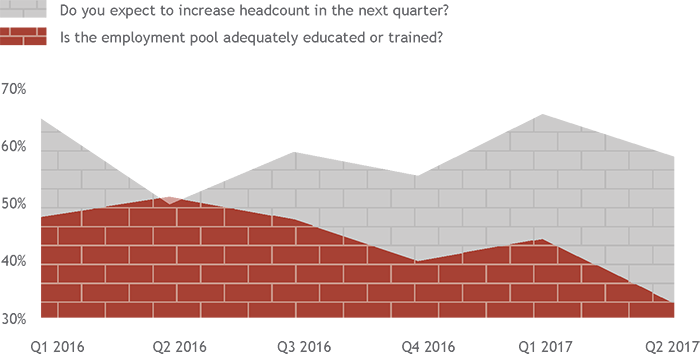
Entrepreneurial ambitions not dented by Brexit, but access to talent is an increasing concern.
Entrepreneurs remain confident in growing their own business, although they are increasingly unsure of finding the right people for the job.
Our research shows that entrepreneurial businesses remain ambitious about their potential to grow, with just under 60% expecting to increase headcount– a result that has not been affected by Brexit.
However, there is growing concern about the relative readiness of potential employees: only 32% believe that the employment pool is adequately trained. The steadily downward trend on this score does not bode well for ambitious, fast growth businesses.
Businesses need employees who are adequately trained – but because of Brexit, entrepreneurs are not sure that those people will be available to them.John Morris
The broad message from our research is that entrepreneurs are resilient – their ambitions are still high and have not been hugely affected by Brexit. The market has become used to absorbing change, from regulatory crosswinds to political and macroeconomic upheaval, in the UK and the wider world. Although these changes can have an impact on the day-to-day management of a business, has not poured cold water on entrepreneurial growth plans.
Nonetheless, one of the most reported impacts of Brexit is movement of labour. Entrepreneurs seem to recognise that a consequence of restricted movement of labour will be a potential reduction in access to the talent required to build their business.
As it stands, without ready access to talent, including talent from outside of Europe, British business will be negatively impacted.
Skill shortages: a growing issue
One of the most significant issues for scale-up companies remains skill shortages, according to the ScaleUp Institute, a private non-profit company that identified six main gaps as to why businesses struggle to scale in the UK.
Our own research supports this, validating the prediction that within the next year, only 20% of business leaders believe there will be enough appropriate, relevant and qualified talent in the workplace. It’s unclear whether the employment pool itself has shrunk, or whether the existing workforce lacks the skills and training required to be successful in a scale-up business.
One reason scale-ups look to the EU for talent is a lack of confidence in the local employment pool; entrepreneurs do not feel that the national workforce is adequately training people to move into business.
The government could provide real support at this stage: not only by creating a scale-up visa, enabling talent to enter the UK regardless of the impact of Brexit, but also by supporting the appropriate training of our home-grown talent. Arguably, training our school leavers and students for the world of work will be crucial to British businesses in the long run – regardless of the impact of Brexit.
Growth: potential vs. preparedness
The Brexit paradox
One interpretation of our results focuses on the paradox of Brexit. In order for scale-up businesses to expand despite Brexit, businesses need employees who are adequately trained – but because of Brexit, entrepreneurs are not sure that those people will be available to them.
In other words, ambition is what drives entrepreneurs – but access to the workforce they need to fulfil that ambition is by no means guaranteed.
If fewer workers enter the UK, businesses should look more closely at their existing employees, assessing whether there is talent available that can be further developed and trained to provide the skills required. It is advisable for firms to begin this process now rather than waiting for the final shape of the Brexit deal to emerge.
DISCLAIMER
By necessity, this briefing can only provide a short overview and it is essential to seek professional advice before applying the contents of this article. This briefing does not constitute advice nor a recommendation relating to the acquisition or disposal of investments. No responsibility can be taken for any loss arising from action taken or refrained from on the basis of this publication. Details correct at time of writing.
Disclaimer
This article was previously published on Smith & Williamson prior to the launch of Evelyn Partners.

